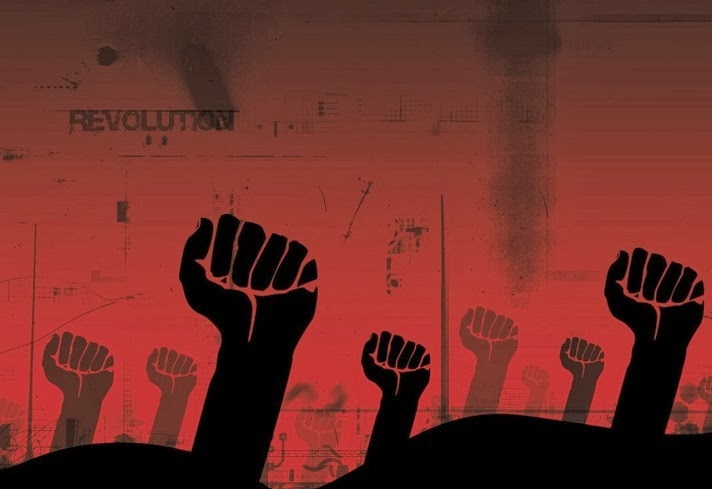“You are pitiful insolated individuals; you are bankrupts;
your role is played out. Go where you belong from now on – into the dustbin of
history!” – Leon Trotsky
1917 was a year full of dramatic turmoil for
the Russian Empire. It was the year of the February Revolution as well as the
October Revolution and the year ended with the formation of the Cheka (Bolshevik
security force) in late December.[i] The
Russian Empire collapsed and the Romanov Dynasty ended in February, but it was
not until the October Revolution that the Bolsheviks instituted themselves as
the new government. A brutal Civil War broke out in October of 1917 and lasted
until 1922 when the Bolsheviks squelched the remaining opposition to Communism.
It was in 1922 that the Union of Soviet Socialist Republics was born and the
world was given its first taste of Communism.
The Bolsheviks were one of the two factions
that split from the Russian Social Democratic Labor Party, the other being the Mensheviks.
The faction gained power and officially split away from the RSDLP in 1912; they
were led by Vladimir Lenin. Once the Bolsheviks gained full control of the
Russian Empire, they were able to form it into a Socialist Republic. This new ideology
instituted by the Bolshevik Communist Party, often called Leninism, lasted
until 1991 and did not follow with Marx’s original ideology of Communism. In
Marxist terminology, it was an exchange of one form of exploitation for
another, not the progressive step Communism was supposed to be. Marxist views were
more natural and included the abolishment of the ruling class, not the exchange
of exploitation that happened under Bolshevik rule.
Karl Marx and Frederick Engels were the
founders of an economical movement that would erupt and turn civilization
upside down; Communism. It was an economic and political idea created to give
the working man, or the proletariat, hope in this world. Marx’s expectation was
for communism to engulf capitalism and then end exploitation of the proletarians.
His key writing on this was Manifest der Kommunistischen Partei,
translated The Communist Manifesto. In this pamphlet he outlines the
problems with the bourgeois, the wealthy class, and why overthrowing them is
necessary.
The history of Marx and the birth of
communism began with his research in the factories of the Industrial Revolution
which began in the 1830’s. He was disgusted by the conditions of workers in the
factories and blamed free buying, or capitalism, saying that this form of
economics devalues the worker and turns him into a commodity to be exploited by
the bourgeois. Marx was angered by what he called the “alienation of man”, the
separation of man from his labor. The frustration and anger at this treatment
is evident at the end of The Communist
Manifesto when he writes, “…the Communists everywhere support every revolution
movement against the existing social and political order of things.”[ii] His anger at the present state of the working class outweighed his plan for the
perfect, utopian society of Communism.
Karl Marx met Frederick Engels for
the first time in the summer of 1844[iii].
Engels was a radical socialist proponent whose writing caught the attention of Marx.
Engels wrote for Robert Owen’s publication titled, “New Moral World”.[iv] Marx and Engels became fast friends and collaborated on several publications
together, including The Communist Manifesto, which they released in
1848. Within the pages they outlined the idea of reaching a utopian society in ten
steps. These steps range from the abolition of private property to the abolition
of inheritance rights, the centralization of communication and transportation
by the State and free education.
The predominate theme within all of this is
the overthrowing of the bourgeois and abolition of man by destruction of all
social classes. Marx also took great strides to show that the Communist party
was not separate from the other proletarian parties, but a party that is most
interested in coming to the aid of the others. He explains that the Communists
are only different from the other proletarian parties in two ways, they bring
the common interests of the proletarians to the forefront, “independently of
all nationality”[v];
and in the stages of the proletarian and bourgeois struggles, they represent
the desires of the entire proletarian movement as a whole. Marx believed
that Communist desires were the exact same as all other parties, in that they
want to form all the proletariats together and overthrow the bourgeois social
order. The coup by the proletariats could only be achieved through Marx’s
drastic steps, only then the utopian society yearned for would finally
materialize.
[i] Figes, Orlando (1996). A People's Tragedy
[ii] Karl Marx and Frederick
Engels. The Communist Manifesto. (Filiquarian Publishing: 2005), p. 54.
[iii] Heaven On Earth,
dir. & prod. Brittney Huckabee, 2005. DVD. New River Media & BJW, Inc.
2005.
[iv] Ibid
[v] Karl Marx and Frederick
Engels. The Communist Manifesto. (Filiquarian Publishing: 2005), p. 23.


No comments:
Post a Comment